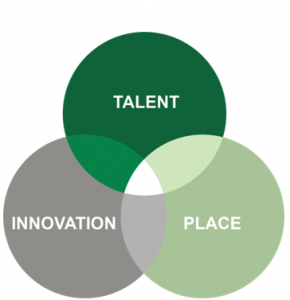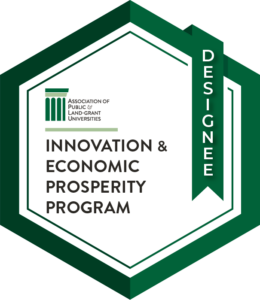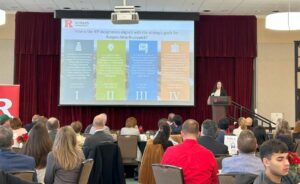Process
Rutgers University-New Brunswick conducted a self-study on its innovation and economic prosperity initiatives as part of obtaining the Innovation and Economic Prosperity (IEP) designation from the Association of Public Land Grant-universities (APLU) from 2022 to 2024. The process for achieving this designation helped the University have a better understanding of how it maximizes knowledge generation, the innovation ecosystem that supports it, and the economic impacts it generates. It also helped identify where improvements can be made to facilitate these efforts and to increase the benefits of the university to broader society.
Stakeholder Involvement
The IEP designation process required the involvement of many faculty, staff, students, and administrators to capture the efforts across the campus. External stakeholders provided input as well. A total of 217 internal and external stakeholders provided input: 96 one-on-one interviews of faculty and staff; 34 online surveys; and 87 participated in facilitated discussions during the Innovation and Economic Prosperity (IEP) World Café event.
The Bloustein Center for Survey Research assisted with the collection of information from the stakeholders through one-on-one interviews and facilitated discussions. These efforts started in April 2023 and continued to January 2024.
To further engage internal and external stakeholders, the IEP World Café was held on November 8, 2023. At this half-day event utilizing a “world café” model for larger group dialogue, internal stakeholders (faculty, staff, and students) discussed topics centered around the Rutgers-New Brunswick Academic Master Plan: scholarly leadership; innovative research; student success; community engagement; and support services. At the same time, external stakeholders (industry, nonprofit, and governmental attendees) had discussions regarding diversity, inclusion, and community engagement; research; outreach and service; collaboration; talent development; funding; and communications. The facilitated discussions that occurred at the IEP World Café were then synthesized, and the recommendations were incorporated into the IEP application.
As part of the self-study, internal and external stakeholders were asked questions about their work at or with Rutgers and how it incorporates talent, innovation, place, and economic prosperity, as defined below.

- Talent – education and workforce development that help prepare students (traditional and non-traditional) for jobs, careers, and a lifetime of success.
- Innovation – research, service and outreach programs that support innovation, technology-based economic development, and entrepreneurship, which fuel the innovation economy.
- Place – public service, outreach and extension, and community engagement that contribute to social, cultural, or community development and the stewardship of place.
- Economic prosperity is measured as impact with emphasis on how the outputs of University-produced knowledge and innovation improve the human condition either through direct intervention or indirectly through changes in government or business policies and practices. Examples of specific impacts could include: industry-research partnerships, technology transfer, technical assistance to businesses, entrepreneurial development, industry training and education, jobs created, new businesses created, sustainable and resilient businesses, communities, and environments.
Logic Model
A logic model is a systematic approach to planning, implementing, and evaluating programs. For the IEP designation process, the following logic model was used to illustrate that by conducting the self-study, the University will have an internal awareness of innovation and economic prosperity programs as well as the recognition of areas of growth and improvement. Ultimately, the self-study will result in increased visibility, partnerships, and improved community. APLU IEP Designation
APLU IEP Designation

The IEP designation application for Rutgers-New Brunswick was submitted to the APLU in May 2024. Rutgers’ IEP application was based on a self-study conducted from 2022 to 2024, where information was collected from 217 internal and external stakeholders: 96 one-on-one interviews of faculty and staff; 34 online surveys; and 87 participated in facilitated discussions during the IEP World Café event. This data was then synthesized along with information from relevant university reports, and incorporated into the IEP application.
In July 2024, Rutgers-New Brunswick was awarded the IEP designation from the APLU for demonstrating outstanding programs that enable the university to maximize the economic and community engagement impact of the institution, as well as a strong plan for growth and improvement to further build these capabilities. Rutgers-New Brunswick joins the ranks of over 80 higher education institutions holding this designation.
Thank You
The self-study team would like to thank Chancellor Francine Conway and her office for their leadership, inspiration, and support in this effort.
Much appreciation to the Rutgers Bloustein Center for Survey Research for their outstanding professionalism, organization, and meaningful delivery of one-on-one interviews and facilitated discussions to capture the feedback from the community.
Additionally, thanks to the representatives from the Chancellor-led units who served as the points of contact and were instrumental in selecting and recruiting stakeholders to participate in the self-study. And to Brian Kurisky, Executive Director, Rutgers Collaborative for Community Engagement at DICE, who generously shared related information from the Carnegie Reclassification effort he is leading.
And finally, thank you to the internal and external stakeholders for their constructive feedback and input on the vision of a campus with an even stronger commitment to regional economic and community development.


